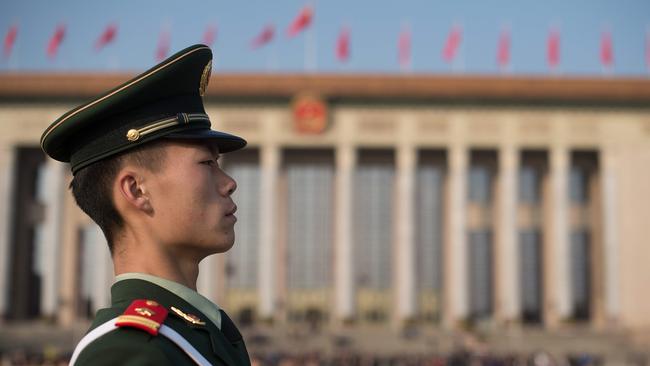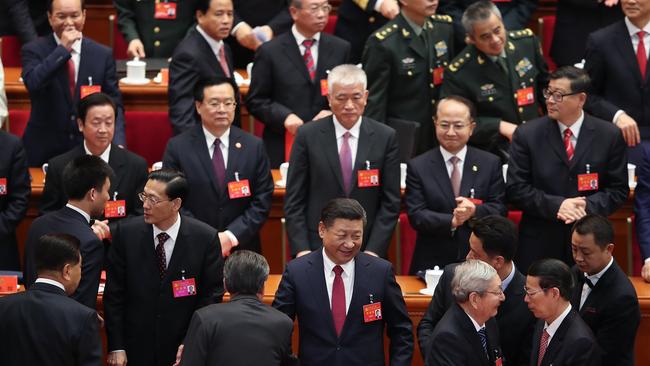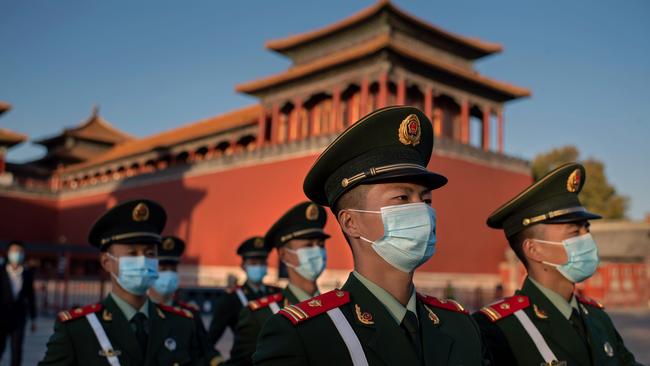Australia might love it when China’s plan comes together
A week before the US election, the elite of the Chinese Communist Party will gather in a Soviet-style hotel to plot their uncertain future.

One week before the November 3 US presidential election, the elite of the Chinese Communist Party will gather in a Soviet-style hotel to plot their uncertain future.
The venue is never disclosed, but precedent suggests that on Monday, black Audis will transport the 370-odd members of the Communist Party’s central committee to Beijing’s Jingxi Hotel, a concrete facility run by the People’s Liberation Army, known for its tight security, total discretion and excellent yoghurt.
Just the venue to prepare the next five-year-plan for the country’s $20 trillion economy.
The four-day closed-door affair is the key overarching policy meeting for the most successful Leninist political party in history.
China’s famously controlling leaders will gather at a moment of extreme uncertainty.
“The period covered by the 13th Five-Year Plan will present even more complex domestic and international environments for China’s development,” the nation’s leaders wrote in their last five-year plan, which was drafted in 2014 and released in early 2015 — and still has a few months to run.
They could never have imagined just how complex that environment would become. First US President Donald Trump overturned more than half a century of international trade policy with no-holds-barred tactics that stunned Beijing. Then the trade war had barely ended when a new coronavirus was detected in Wuhan, forcing the shutdown of the Chinese economy, and then the entire global economy as well.
COVID-19 is now all but under control in China, but only after it precipitated the biggest political crises of President Xi Jinping’s eight years in power. That was followed by souring international opinion as “Wolf Warrior” diplomats bristled about China’s role in the once-in-a-century pandemic.
And, still more ominously, a furious Trump gave the green light to hardliners in his administration to transform the trade war into a tech war, which has sent shudders through China’s economy.
It is an environment rich with what China’s leaders most fear: instability. “Will the coronavirus be contained in the rest of the world or not? Will they face a Biden administration or a Trump administration? And what will that mean for the world’s two biggest economies?” asks Tom Orlik, author of China: The Bubble That Never Pops.
“These are huge questions and I don’t think anyone knows the answer. And I don’t think they know the answers in Beijing either,” Orlik tells Inquirer from Washington DC.

China’s big idea for these uncertain times is the “dual circulation” theory, a concept first coined by a Chinese academic in the 1980s. When it was first proposed in the Deng Xiaoping era, its focus was on the external part of the economy, particularly exports and how to grow them.
The current incarnation of “dual circulation” theory focuses on the domestic economy. Championed by Liu He — Xi’s chief economics adviser and childhood friend — it has been presented as a blueprint for self-reliance, in response to the increasingly fraught world China confronts.
It is also the result of Beijing’s assessment that the coronavirus will cripple growth in major overseas markets for years to come.
“Based on the anti-epidemic situation of European and American countries, its impact on the macroeconomics of European and American countries may last for three years,” Professor Mei Xinyu tells Inquirer.
The Beijing-based researcher at China’s Ministry of Commerce says the focus on domestic consumption will, in his estimation, allow China to achieve an average annual growth rate of about 5 to 6 per cent over its next five years.
That would be an extraordinary achievement for the world’s second-largest economy, which is on track to be the only major economy to grow in 2020. Signalling ahead of the plenum has also included Xi’s plans to increase the role of the party within private businesses. Orlik, chief economist at Bloomberg Economics who was based in China for the decade to 2018, points to the “massive herd of unicorns frolicking around Shenzhen” as evidence that concerns Xi’s regime has stifled innovation may be overdone.
“It doesn’t seem to me like a sclerotic, late days of the Soviet Union situation,” he says.
Shadowing over those “unicorns” — a privately held start-up company valued at more than $1bn — are Tencent and Alibaba, two of the world’s biggest tech companies, each founded by members of the CCP.
In his fascinating new book, Orlik writes that while not “all-knowing or all-powerful”, China’s policy makers “are more imaginative and flexible than their critics give them credit for.” Orlik also diagnoses an affliction he sees around the world called “Sinophrenia”, which he describes as “the simultaneous belief that China is about to collapse and about to take over the world”.
Sufferers of Sinophrenia will have lots to parse from next week’s meeting. So will Canberra.
Treasury and the Department of Foreign Affairs and Trade will be particularly focused on how China plans to reshape its post-COVID economy, says Richard Maude, the former head of the Office of National Assessments.
They will also be looking for clues about how China will manage its relationship with the US, and what its plans for energy security, carbon reduction and food security could mean for the $120bn of exports that make it by far Australia’s No 1 trade market.

“The other thing the system always looks at is the politics. Nobody expects the centralisation of power under Xi to shift. But people will be reading the tea leaves to see who is in favour and who is not,” Maude, senior fellow at the Asia Society Policy Institute, says.
Speculation has focused on the future of Xi’s longtime confidant Wang Qishan, the current Vice- President who previously oversaw the anti-corruption campaign that entrenched Xi’s power.
Three weeks ago, the Central Commission for Discipline Inspection announced that an assistant who had worked closely with Wang for decades was under investigation on suspicion of “serious disciplinary violations”. Those are ominous words in Chinese politics.
The outlook is sunnier for Australian business, says David Olsson, the international director of King & Wood Mallesons. While China’s focus on increasing technological and manufacturing self-sufficiency is expected to reshape its economic relationship with Germany, the complementarity with the Australian economy should continue through the next five-year plan.
Although politics may get in the way. “China’s emerging priorities are very much aligned to our strengths. There’s a growing demand for clean, healthy, high-quality products,” Olsson, who is also the national president of the Australia China Business Council, tells Inquirer from his new base in Hong Kong.
But as Australia’s beef, barley and wine producers have learned this year, there are complications to being aligned with the Chinese market.
“It’s going to be a bumpy ride,” Olsson admits.
Could things get a little less bumpy on the other side of the US presidential election and one of the most significant meetings of Xi’s political career?
Possibly, says Linda Jakobson, the founding director of the Sydney-based policy institute China Matters.
“There’s such a focus on the plenum that everything else takes a back seat,” Jakobson tells Inquirer.
“There could be a possibility that some of these tense and really off-the-rails bilateral relationships receive the attention that they need to start functioning again. That would include Australia.”
For at least another week, however, Prime Minister Scott Morrison shouldn’t wait by the phone.


To join the conversation, please log in. Don't have an account? Register
Join the conversation, you are commenting as Logout